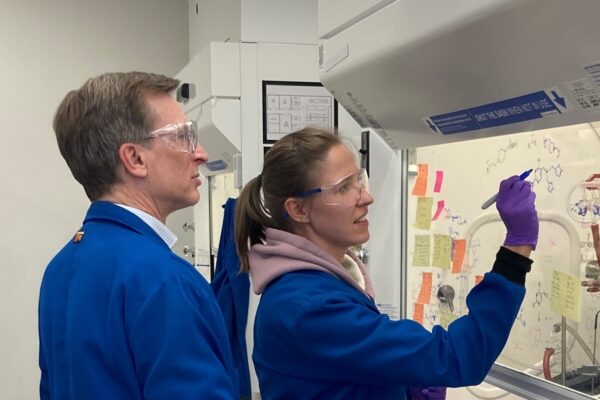ConnCAT Endowment Fund
Est. 2022 by Craig Crews, Ph.D. and Katherine McKenzie, MD, FACP

As a scientist developing new drug technologies to fight cancer, Craig Crews, Ph.D., has often worked “from grant to grant to grant.” So, he knows just how much time the process of looking for funding can take away from an organization’s main mission.
Dr. Crews, the John C. Malone Professor of Molecular, Cellular and Developmental Biology at Yale University, has taught at Yale for 27 years and directs a team of 25 researchers and students in the Crews Lab at Yale.
An internationally renowned and award-winning scientist and editor of numerous scientific journals, Dr. Crews is also a leader in New Haven’s growing biotech industry. He has established four New Haven-based biotech companies including Arvinas, Inc an oncology-focused biotech firm which employs more than 350 people. His two newer companies, Halda Therapeutics, LLC and Siduma Therapeutics, LLC are each “working on technologies that come from my Yale Lab.”
When he decided to create a fund at The Community Foundation for Greater New Haven to support ConnCAT, the New Haven-based nonprofit whose mission it is to “use education and training to revitalize the landscape of the urban community,” he knew right away that it had to be an endowment fund.
He established the ConnCAT Endowment Fund because, “without endowments, organizations often don’t know what their financial realities will be year to year, which hampers long-term planning and impacts retention of quality talent,” he said. “Rarely is there an initiative that follows a straight line. You need to be able to assess the landscape, analyze the problems and challenges, and make changes or take new directions. I wanted to give to ConnCAT because I believe in their mission. And I want to liberate them as much I can from having to raise money so they can do the great work they do.”
Dr. Crews first became familiar with ConnCAT through his longtime friend Erik Clemons, the nonprofit’s founder and former executive director. “I’ve always known of their work helping the underserved get back on their feet and how it began by helping formerly incarcerated people get back into the workforce with training in phlebotomy,” Dr. Crews said. “I’ve watched as they expanded the program into culinary training and medical coding.”
“I love the combination of their workforce training and their commitment to the community, how they offer wraparound services like an after-school youth program, tutoring and workforce training, giving adults and young people the skill sets necessary to compete in the job market,” Dr. Crews said. “It is something I feel needs to be supported.”
It turns out that his company, Arvinas, is located just across the parking lot from ConnCAT’s industrial training kitchen, where participants are trained in food and beverage operations, advanced culinary skills, baking and pastry arts. The program also helps participants attain national certification in food safety and preparedness. At ConnCAT’s Orchid Café, students hone their skills as chefs and caterers.
“There was a grand opening at the Orchid Café, and it was just wonderful to see the community coming out to celebrate this institution that is for and about the New Haven Community,” he said, noting that he now uses Orchid Café as the go-to caterer for lab and company events.
After becoming more involved in ConnCAT and seeing its impact on underserved people in the community, Dr. Crews said he wanted to do even more. “There’s a real need to make sure that the New Haven community, as a whole, proportionately benefits from the successes of the local biotech companies. I’m acutely aware that my workforce doesn’t entirely match the demographics of my community and I want to change that.”
In addition to creating the Fund, he’s developing a partnership between ConnCAT and biotech firms in the city, as well as with Yale University, so that ConnCAT can offer an additional training program in lab operations.
“Our mission is to train 18- to 26-year-old New Haven residents who aren’t thinking of college but are looking for a way to break into the biotech biopharma ecosystem,” he explained. “There are a number of positions in these companies that don’t require a college degree. I hope to be able to diversify the workforce and bring more New Haven residents into the successes of these companies while also giving them a path forward.”
Giving back to the New Haven community matters a great deal to Dr. Crews and his wife, Kate McKenzie, MD, FACP, a Yale School of Medicine faculty member and the founder and director of the Yale Center for Asylum Medicine, where she “provides objective medical assessments of people who report experiencing torture or persecution in the countries from which they have fled.”
Dr. Crews said he and Dr. McKenzie have talked together a lot about what it means to be part of the community and to have a shared sense of responsibility for it. “I’m energized by working with different teams, and trying to make a difference for patients and their doctors, giving them choices, and make a difference in my trainees in my lab and so that the next generation of scientists are enabled to do the best they can; and, I’m interested more and more in my community because I feel like I do have the ability to hopefully make some change.”
